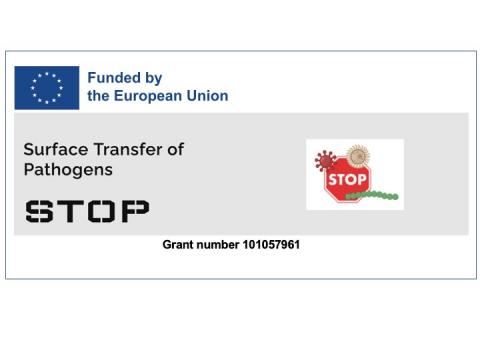- Home
- Department
- Research
- Teaching
- Post Graduate Studies
- Services and Equipment
- Knowledge Transfer
STOP project: Novel nanocoatings against viruses and bacteria
Large International Projects with DSV as PARTNER

Surfaces in highly frequented areas as door openers on trains and buses, key pads on cash machines, hospital door handles can promote transmission of viruses or bacteria with dangerous consequences, especially for older people, small children and those with previous illnesses. Nanocoatings applied to these high-traffic surfaces should restrict these transmission routes, preventing contact infections via surfaces and thereby increasing health protection. This approach is adopted by the EU research project “STOP – Surface Transfer of Pathogens”, coordinated by (BAM) and the University of Birmingham (UoB) with the participation of UNITS and other 12 European partners from industry and academia. The Researchers will develop and evaluate various substances that enable highly flexible and durable coatings, have a broad spectrum of antiviral and antimicrobial properties and avoid the development of resistance. The researchers’ focus is on nanoparticles and antimicrobial peptides - protein molecules that are also naturally produced by living organisms to defend themselves against bacteria. In addition, the experts will investigate whether the antiviral and antibacterial effects can also be achieved via nanoscale surface modifications of high-touch materials - combining nano-structures with chemical modifications to enable even better protection. At UNITS, the in-house developed HELP biotechnology will be applied to realize biomimetic nanostructured surfaces with antimicrobial properties, mimicking the vertebrate skin that acts as a protective barrier against pathogenic microorganisms present in the environment. The efficacy of the nanocoatings both in the laboratory and under real-world conditions, will be tested by new methods, which then should lead to new standards for antiviral and antibacterial testing of high-touch materials. In addition, the researchers will investigate the safety aspects of nanomaterials through detailed studies on human and environmental toxicity and life cycle analyses. The in-presence kick off meeting will take place on Dec 8th and 9th 2022 in Birmingham.
The project will run until August 2026 and the first results are expected in February 2024.
Responsible: dr. Antonella Bandiera
link to the CORDIS website for the project at https://cordis.europa.eu/project/id/101057961
link to the project website: stop-pathogens.eu
Last update: 12-12-2022 - 16:21


